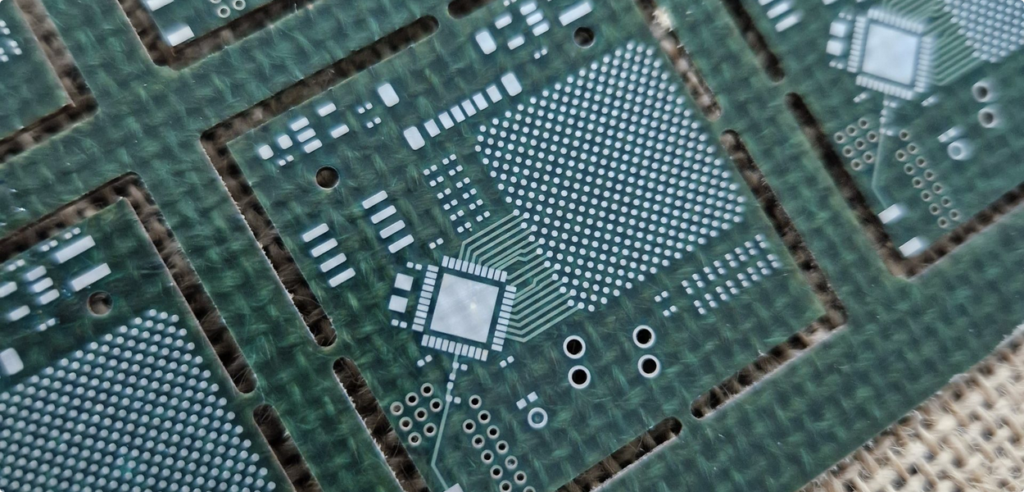
Jiva and the University of Portsmouth have been awarded a Knowledge Transfer Partnership (KTP) by Innovate UK to further develop and commercialise Soluboard®, the world’s first biodegradable printed circuit board (PCB) laminate.
This collaboration aims to combat the increasing problem of electronic waste (e-waste) and offer a sustainable solution to the environmental challenges posed by the disposal of electronics.
Electronics represent a growing waste problem globally. On average, each person in the world generates 7.5Kg of electronic waste every year. The UK alone contributes over 2 million tonnes of e-waste annually, with PCBs believed to account for 8% of all e-waste.
PCBs are typically manufactured on a glass fibre epoxy laminate, usually with a persistent organic pollutant as the flame retardant – this has been the same for well over 70 years.
At the end of life, less than 50% of electronic waste is collected and recycled correctly and even then, if the gold, silver and platinum metal content is too low, they are shredded and landfilled or incinerated.
Jiva has developed and is commercialising a new laminate called Soluboard® to replace the glass fibre epoxy laminate that will lead to two benefits: firstly, a much-reduced CO2 burden and secondly, a way of reducing the £8 billion worth of critical minerals landfilled every year.
Jiva will work with Professor Hom Dhakal and his team from the School of Mechanical and Design Engineering in the University’s Faculty of Technology, who will test and characterise the properties of natural fibres, such as jute, flax and hemp, for their use as potential laminate materials. The KTP will help speed the development and commercialisation of new advanced versions of the Soluboard that can be used in advanced electronics.
Dr Jonathan Swanston, CEO of Jiva, said: “We are thrilled to collaborate with the University of Portsmouth and especially Professor Dhakal and his team. This partnership aligns with our vision of reducing the environmental impact of electronic devices. Jiva has been at the forefront of creating materials that are both sustainable and functional. The University’s expertise in developing natural fibre laminates make them the perfect partner for Jiva.”
Professor Hom Dhakal, Head of Advanced Polymers and Composites Research Group at the University of Portsmouth and academic lead for the project, said: “The University of Portsmouth delights in creating, sharing, and applying knowledge to make a difference to individuals and society. We have a strong research and innovation focus on sustainability and the environment, as well as future and emerging technologies.”
“This collaborative KTP project with Jiva Materials, wonderfully suits a mutually prioritised goal of working together towards achieving a sustainability agenda. We believe that the experience gained from this partnership will significantly contribute towards delivering more sustainable materials and increased circularity in the sector by combating the problem of e-waste.”
Stephen Woodhouse, Knowledge Transfer Advisor for the project describes the benefits of the collaboration: “The knowledge and skills embedded by this new KTP collaboration will enable Jiva Materials to scale-up and grow their business at pace, whilst simultaneously achieving technical novelty and greater efficacy through access to world-class research expertise. I’m confident that the collaboration with the team at the University of Portsmouth will provide a firm foundation for a series of exciting future innovations by the business.”
“I’m delighted Innovate UK KTN were able to help convene this partnership and to support the development of their successful grant application. I look forward to providing guidance throughout the life of the project and beyond.”
About Jiva
Jiva Materials Ltd is a UK based company developing naturally derived materials for the printed circuit board market. Soluboard® is the world’s first fully recyclable rigid PCB laminate with a 60% lower carbon footprint compared to glass-fibre and epoxy technologies. Available as a copper clad laminate, the organic structure can be dissolved using hot water within a controlled environment.
This enables the recovery of the natural fibre, copper and electronic components containing rare and expensive minerals. The electronic components recovered from Soluboard® PCBs can be reused in many cases. Soluboard® can be used to produce double-sided PCBs with plated through hole (PTH) technology. It is compatible with industry standard PCB fabrication processes and has electrical properties comparable to market incumbent laminates.
About the Advanced Polymers and Composites (APC) Research Group
The Advanced Polymers and Composites (APC) Research Group from the School of Mechanical and Design is based in the Faculty of Technology at the University of Portsmouth. The APC Research Group interests range across a variety of research and development activities including analysis, characterisation, formulation, manufacturing, design, modelling, rapid prototyping, 3D printing, testing and knowledge transfer of advanced polymers and composites.
The APC Research Group focuses on applied research into various areas (such as tension, compression, bending, impact, stress, strain, torsion, buckling, fatigue, fracture, thermal, vibration, absorption, among others) of materials and components. It generates cutting-edge research work in advanced sustainable composite materials and manufacturing through collaborative partnerships with industries and other partners. Through original research publications and international collaborations, the APC Research Group continues to build its profile nationally and internationally. It further aims to contribute significantly to teaching and knowledge transfer activities of the School of Mechanical and Design Engineering.
About the University of Portsmouth
The University of Portsmouth is a progressive and dynamic university with an outstanding reputation for innovative teaching and globally significant research and innovation. The University’s research and innovation culture is impacting lives today and, in the future, and addressing local, national and global challenges across science, technology, humanities, business and creative industries.
Source
Jiva Materials, press release, 2024-01-15.
Supplier
Innovate UK
Jiva Materials
University of Portsmouth
Share
Renewable Carbon News – Daily Newsletter
Subscribe to our daily email newsletter – the world's leading newsletter on renewable materials and chemicals









